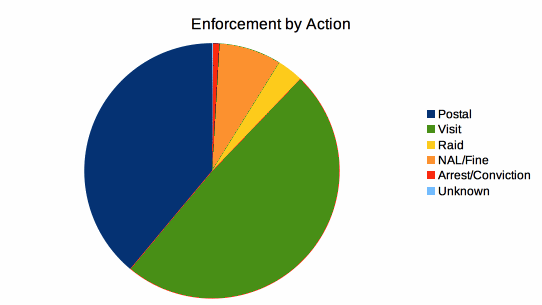It’s been an active spring for field agents in the FCC’s Enforcement Bureau, but the agency’s pirate-hunting fervor still seems tempered. The present pace of this year’s activity mirrors 2011 – good news of a sort, because last year saw a massive drop-off in enforcement action.
That said, about four dozen pirate stations in 13 states (and Puerto Rico) have had some sort of contact with the federales this year. Although the FCC’s enforcement protocol remains firmly in the administrative realm, there have been some interesting developments this year.
 The FCC seems to be ratcheting up the size of the monetary penalties it assesses against pirate broadcasters. To date, the Enforcement Bureau’s issued eight forfeitures this year seeking a total of $102,500. In all of last year, the Bureau issued nine forfeitures worth $168,400. If this pace continues, 2012 could be the FCC’s most fine-happy ever (a distinction currently held by 2003, when the Bureau billed 18 pirates for $186,100).
The FCC seems to be ratcheting up the size of the monetary penalties it assesses against pirate broadcasters. To date, the Enforcement Bureau’s issued eight forfeitures this year seeking a total of $102,500. In all of last year, the Bureau issued nine forfeitures worth $168,400. If this pace continues, 2012 could be the FCC’s most fine-happy ever (a distinction currently held by 2003, when the Bureau billed 18 pirates for $186,100).
Some of these cases are pretty spectacular. One San Diego-area pirate who operated on multiple frequencies since at least 2010 got socked in March with two $25,000 fines. That’s one of the largest forfeitures in modern microradio history. In Tennessee, because a microbroadcaster refused a field agent’s request to inspect his station, the FCC seeks $22,000 from his hide.
This tactic is much more impressive on paper than in the real world. It’s notoriously difficult for the FCC to collect on the forfeitures it issues, and in many cases with pirates, fines are statutorily reduced when a person demonstrates an inability to pay. Stiffening monetary penalties for refusing an FCC inspection is also a legally-questionable venture.
The more troubling development, however, comes not from the FCC. The ranks of bad apples operating dirty transmitters appears to be growing, especially in and around New York, where the Federal Aviation Administration reported five pirates for alleged interference with “frequencies…used by airplane pilots to communicate with airports in the New York City Metropolitan Area.”
If true, this does not bode well for the public perception of pirate radio – and while it can sometimes be a dicey proposition, some self-policing among unlicensed broadcasters is definitely in order. Running a homegrown radio station is not rocket science, and proper signal filtering is both inexpensive and unobtrusive. If you’re already taking the risk, why not do it right?
The broadcast industry claimed more than a decade ago that pirate radio stations could make airplanes fall from the sky. It’s as ludicrous today as it was then, but the NAB and its state-level counterparts will use cases like these to push for the further criminalization of electronic civil disobedience. The FCC will welcome any assistance it can get.
Skip to content